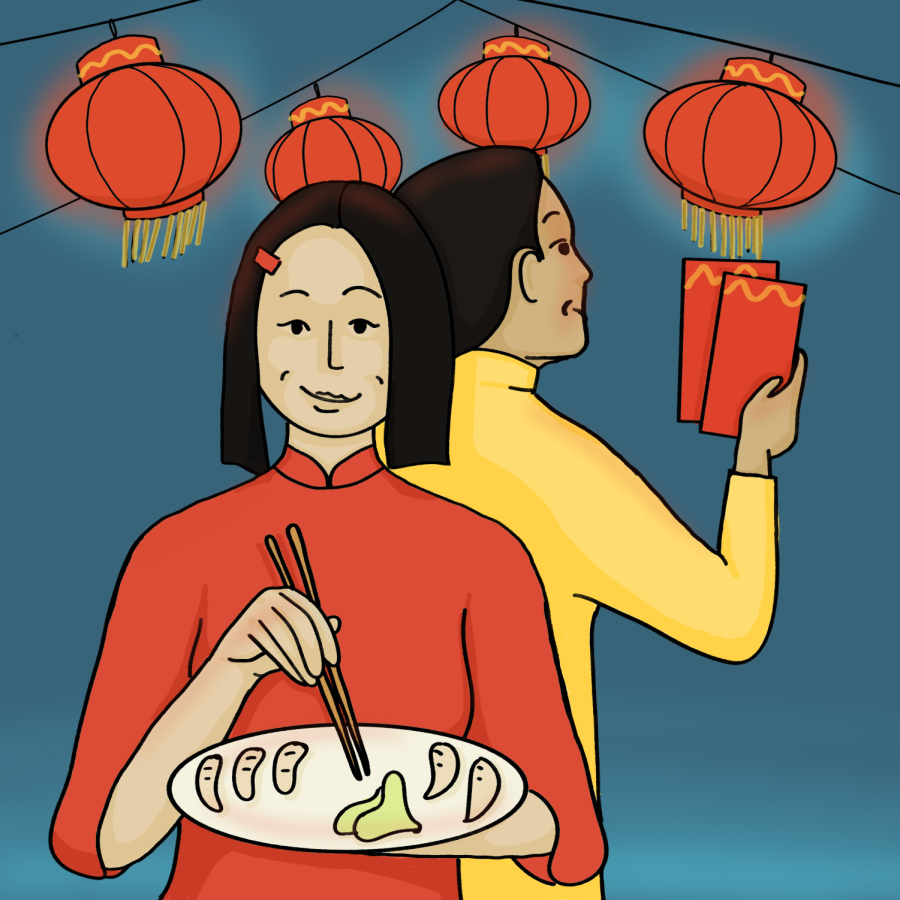‘Lunar New Year means a new beginning, new start’: Students and staff celebrate Lunar New Year
Many celebrate Lunar New Year with family gatherings and an array of food.
On Jan. 30, the Sunday before Lunar New Year, Social science teacher Hao Pham booked a flight to Orange County to celebrate Tết, or Vietnamese Lunar New Year. Despite only spending six hours with his siblings, he explored Phước Lộc Thọ, a Vietnamese mall, where he was able to welcome the new year.
Lunar New Year is celebrated by multiple Asian cultures similar to the way many parts of the world celebrate New Years on the first day of January. Lunar New Year, on the other hand, celebrates the first day of the lunar or lunisolar calendar where instead of using just the solar system to determine the days like the Gregorian calendar, it uses both the moon phases alongside the solar system.
For senior Princess Bergado, Lunar New Year is about spending time with family while celebrating new beginnings. Although Bergoda is Filipino, her family celebrates some Chinese culture, such as Lunar New Year.
To celebrate, Bergado eats both traditional Filipino and Chinese food with her family.
“We eat a mix of Filipino food and Chinese food. My family also eats a lot of Asian snacks,” Bergado said. “If you were to go into Ranch 99 where all the Lunar New Year stuff is, we eat all the dried fruit and sesame seed snacks. Then for dinner itself, we have dumplings and a lot of soup.”
Like Bergado, junior Ryan Lee also celebrates Lunar New Year by having big celebrations with his family and tons of food. For Lee, however, his favorite part about the holiday are the arts, especially when it comes to his Korean culture.
“One of my favorite aspects of Lunar New Year is anything that has to do with the arts, so decorations, dances, music and anything like that,” Lee said. “There’s also a lot of elaborate outfits. I think traditional Korean clothing looks super cool.”
Another aspect Lee enjoys about Lunar New Year is receiving red envelopes with money inside. Although these envelopes have different names in different Asian cultures, the red envelopes are traditionally filled with money and are used to represent good luck and good wishes for the upcoming year ahead.
Furthermore, good luck and good wishes for the new year is what Pham believes Lunar New Year is all about.
“Lunar New Year means a new beginning, new start,” Pham said. “As far as my memory goes, I remember my parents telling me that it was a new opportunity to wish that the new year would bring lots of fortune, property and good energy.”
Alongside big celebrations and festivals, Lunar New Year comes with different traditions and superstitions to encourage good energy. Pham learned about superstitions from his parents while growing up.
“I’m not sure how true it is, but coming from my parents: on the first day of the new year, the first person to visit your home, if that person has bad energy or just something off, your rest of the year will be off,” Pham said. “I remember my parents making sure those visiting us had to have good energy, or in other words, someone successful, and their success with transfer to us and our whole year will be nothing but successful.”
Like many holidays where celebrations are meant to be spent with family and friends, physical distance can make get-togethers difficult to plan.
“For example, I don’t pass out red envelopes much anymore,” Pham said. “Well I do, but typically, it’s traditionally for giving to your family and their children, but we are all scattered so we don’t get together with all of us.”
Despite barriers some encountered while celebrating Lunar New Year, Pham is grateful for the local Asian communities that allowed people to honor the new year with or without family.
“For the most part, living in the community that we live in, I’m glad there is representation, like SF is very festive for Lunar New Year,” Pham said. “I think it’s important to look in your community and see what events are available in order to celebrate.”


